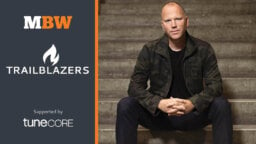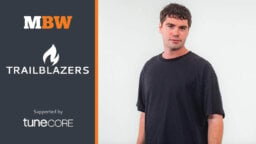Trailblazers is an MBW interview series that turns the spotlight on music entrepreneurs with the potential to become the global business power players of tomorrow. This time, we meet music and tech entrepreneurs Chief Zaruk and Simon Tikhman, co-founders and CEOs of fast-rising music company The Core Entertainment, which launched The Core Records in partnership with Universal Music Group last year. Trailblazers is supported by TuneCore.
Country Music is huge right now, but you don’t need us to tell you that.
A quick look at the US Hot 100 tells a story of the genre’s mainstream dominance in 2024. Shaboozey’s country music hit A Bar Song (Tipsy) (Empire) is the longest-running No.1 single in America this year, holding its place atop the chart for 12 straight weeks.
Beyond Shaboozey’s stratospheric rise, various other 2024 releases show evidence of Country Music’s ongoing creative evolution and commercial success in the streaming age: Beyoncé’s US No.1 album Cowboy Carter, Post Malone’s F1-Trillion (also a US No.1), and Morgan Wallen and Post Malone’s No.1 smash I Had Some Help (Mercury Records/Republic Records).
Country music’s appeal has also traveled to the other side of the Atlantic, as evidenced by Morgan Wallen’s headline performance at British Summertime Hyde Park this summer.
“Country music is in an incredible place right now, both in the U.S. and internationally,” says veteran artist manager Chief Zaruk, co-founder of prominent Nashville and Los Angeles-headquartered music company, The Core Entertainment. “In the US, it’s always had a strong, loyal fanbase, but what we’re seeing now is a much broader audience embracing the genre.”
He adds: “The lines between country and genres like pop and rock are becoming blurry, and that’s opened up a whole new world of opportunity for artists.”
Chief Zaruk and TCE co-founder and CEO Simon Tikhman, who has a background in business and tech, launched their company in partnership with Live Nation in 2019. TCE also develops film and television projects, and works with professional athletes. It also operates an investment arm called TCE Ventures.
TCE’s roster includes breakout stars like Bailey Zimmerman and Nate Smith, plus established rock band Nickelback, as well as rising Universal Music Group Nashville (UMGN) country music stars Dillion James and Josh Ross (UMC/UMGN).
Zaruk spent over 20 years in the music industry before launching The Core. As one of the co-founders of Nashville’s Big Loud, he says he “had the privilege of working with some incredible artists” like Florida Georgia Line, Jake Owen, Morgan Wallen, Chris Lane, Hardy, and more.
Simon Tikhman, meanwhile, started his first company in college, Interactive Athlete, to bridge the gap between professional athletes and fans. He launched various other startups prior to launching The Core Entertainment.
Most recently, he served as Managing Partner and founder at the Fund by First Access Entertainment, supporting various entertainment companies and collaborating on talent development projects, including working with First Access artists including Rita Ora and Zayn Malik.
Additionally, in partnership with prominent sports agent Rich Paul, Tikhman runs RPST Ventures, which he says has made “significant investments” in companies like Batch and ZenWTR. Tikhman’s investment portfolio also includes companies like Robinhood and Philz Coffee.
Reflecting on why they decided to launch The Core Entertainment in 2019 and what their plan was for the company when they set it up, Zaruk tells us that their ambition was to build something “different”.
“I’d spent years in artist management, working closely with musicians and helping them navigate their careers, so I wanted to take that same hands-on, personal approach and apply it to a broader range of talent,” he says.
“Music was a core part of our vision, but we also wanted to venture into other entertainment avenues like sports, film, and TV. The idea was to create a platform where artists and talent across different fields could thrive and grow under one roof.”
Tikhman explains: “We wanted to invest in the artists and talent we believed in, help them build sustainable careers, and create a company that could evolve with the industry as it changes. We’ve built something that fosters both creativity and innovation, and that’s been our driving force since day one.”
The company’s approach to working with artists and their track record in the country music space caught the attention of Universal Music Group, and its Chairman and CEO, Sir Lucian Grainge, last year.
Zaruk tells us that Grainge and UMG contacted them “wanting to know more about how we do things.”
“[Grainge] saw what we were building and reached out,” adds Zaruk. “We walked him through our approach and explained how we’ve done this for artists across various labels, and that’s when the idea of launching our own label together came up.”
The meeting with UMG led to the launch of The Core Records, a joint venture record label between their two companies.
Speaking last year Sir Lucian Grainge noted that Zaruk and Tikhman “have a reputation for identifying some of the industry’s most promising artists”.
Here Chief Zaruk and Simon Tikhman discuss how they identify and develop artists, their partnership with Universal Music Group, and their predictions for the music business..
How is The Core Entertainment positioned within the country space today and where would you like to be within the next couple of years?
Chief Zaruk: Right now, The Core Entertainment is positioned as a company that develops artists from the ground up. We’ve been incredibly hands-on with Bailey Zimmerman, Nate Smith, and Josh Ross from day one.
It’s not just about managing established stars; our bread and butter is taking an artist with raw potential and helping them build a career from A to B, and now we’re focused on taking them from B to Z.
Nate, for example, had already faced some setbacks in the industry, but we believed in him, worked with him, and now he’s become one of the most exciting names in country music. That’s really what we’re all about — helping artists we really believe in and setting them up for lifetime careers.
“It’s not just about managing established stars; our bread and butter is taking an artist with raw potential and helping them build a career from A to B.”
Chief Zaruk
Simon Tikhman: Where we’re headed in the next couple of years is to take that artist development model even further… We’ve done a great job of developing talent, and that’s going to remain at our core. But we also want to be known as the company that can take artists from playing small venues to selling out arenas and even stadiums.
That’s the vision — to develop some of the biggest acts in the world, across all genres. We see ourselves expanding globally and working with artists who are bigger than just one genre or one country. The expertise we’ve built in country music can absolutely be applied to breaking acts in other spaces, and that’s where we’re looking to grow.

You launched The Core Records in partnership with Universal Music Group last year. How did the partnership with UMG come about and why did you decide to launch the record label?
ST: For us, launching The Core Records was about taking our ability to break artists to the next level. We’ve done it successfully for others, but having something internal, a label that we can control, gives us more freedom to develop artists on our own terms while still working with a powerhouse partner like Universal Music Group.
It’s really exciting because it allows us to build a structure where we can continue developing and breaking talent, but now with the added resources and backing of UMG. It’s about elevating what we’re already doing and taking it to that next level.
“Having something internal, a label that we can control, gives us more freedom to develop artists on our own terms while still working with a powerhouse partner like Universal Music Group.”
Simon Tikhman
CZ: The partnership with UMG came about in a pretty organic way. Over the years, we’ve worked with artists who have broken through on different labels, and we’ve shown that we have the ability to take talent from the ground up and build something really special at The Core.
You also have a division dedicated to Ventures/investments. What do you look for in the companies you partner with?
CZ: When it comes to the companies we partner with through our Ventures division, we’re looking for innovative ideas and founders who share our passion for pushing boundaries. Whether it’s in music, entertainment, or other industries, we want to work with companies that align with our vision of creating long-term, sustainable growth.
We’re not just looking for quick returns — we’re looking for projects and people we believe in, who are committed to building something meaningful.
“We’re not just looking for quick returns — we’re looking for projects and people we believe in, who are committed to building something meaningful.”
Chief Zaruk
ST: We focus on companies that are at the intersection of creativity, technology, and entertainment. We’re drawn to businesses that are disrupting traditional models, whether that’s through new technology, unique business strategies, or innovative content creation. We’re also really looking for strong teams led by founders who are passionate, driven, and have a clear vision for the future.
The partnership has to be more than financial. It’s about bringing our expertise, connections, and resources to help them grow in ways they might not have imagined. Our artists are also starting to invest in companies – and they are drawn towards many of these qualities as well.
Who is currently on your management roster and what do you look for in the artists you work with?
ST: We’re really selective about the artists we partner with because it’s important to us that the relationship is a two-way street. We look for people who are passionate, innovative, and ready to grow — not just as artists, but as CEOs of their businesses. It’s that ambition and versatility that really excites us.
CZ: Our current management roster includes some incredible talent including Bailey Zimmerman, Nate Smith, Josh Ross, Nickelback, Valley, Dillon James, Hannah McFarland, Anna Graves and more.
These are artists who have not only proven themselves creatively but also have the drive and vision to support lifetime careers. When we look for artists to work with, it’s about more than just talent. We want artists who are willing to push the boundaries, who have a clear sense of who they are and who are committed to putting in the work to reach their full potential.
What are your short-term and long-term predictions for Country Music’s positioning?
ST: In the short term, country music is arguably the biggest genre out there right now. It’s having a massive moment, not just in the U.S. but internationally as well.
We’re seeing artists like Morgan Wallen sell out huge venues like Hyde Park in London, which just shows that country music’s reach is expanding beyond what it’s traditionally been known for. It’s happening in real time, and it’s incredible to witness.
“In the short term, country music is arguably the biggest genre out there right now. It’s having a massive moment, not just in the U.S. but internationally as well.”
Simon Tikhman
CZ: Yeah, I completely agree. Long term, I think country music is going to become a truly global genre. It’s always been seen as a more domestic, US-focused genre, but that’s changing quickly.
The collaborations, the songwriting, and the involvement of people from outside the traditional country space have elevated it to something much bigger than it used to be.
Some might say every genre eventually slows down or cools off, but I don’t see country going back to where it once was. Sure, it might hit a ceiling at some point—everything does—but I don’t think we’ll ever see that. It’s proven itself, and it’s only going to keep growing from here.
What business and creative trends are you seeing in the market that we should know about?
CZ: On the creative side, one of the biggest trends we’re seeing is the cross-genre collaborations. Artists from different musical backgrounds are coming together in exciting ways, blending styles and expanding their audiences.
You can look at artists like Post Malone as prime examples of this trend, but it’s happening across the board. It’s a creative trend that seems to be sticking because it brings fresh, innovative sounds and opens up new opportunities for artists to reach different fan bases. From a business perspective, I think there’s a shift starting to happen as well.
“More managers, labels, and industry professionals are beginning to focus on developing artists for long-term careers rather than just chasing the latest viral moment or TikTok star.”
Chief Zaruk
More managers, labels, and industry professionals are beginning to focus on developing artists for long-term careers rather than just chasing the latest viral moment or TikTok star.
There’s a growing recognition that building a sustainable career takes time and effort, and it’s not just about short-lived hits. We’re seeing a move towards nurturing talent with the potential for longevity, which is a positive development for the industry overall. It’s all about investing in artists who have the potential to grow and evolve over time.
What advice would you give to aspiring entrepreneurs?
ST: My biggest piece of advice for aspiring entrepreneurs is to really understand and adapt to the individual needs and motivations of the people you work with. For us as music managers, we know that each artist is motivated by different things, wants different things, prioritizes different things… If you can adapt to each of your artists, you can be successful.
Being able to assess and cater to these individual needs is crucial. There’s no one-size-fits-all approach to breaking an artist; success comes from tailoring your strategy to fit each situation. That’s been a key factor in our success with our artists.
CZ: In addition to what Simon said, hard work and reliability are fundamental. If you say you’re going to do something, make sure you follow through. Show people that you care about the work and the people you’re working with. Going the extra mile can make a huge difference. It’s not just about putting in the hours; it’s about being responsible, dedicated, and genuinely invested in what you’re doing. That’s what really sets successful entrepreneurs apart.
What does success look like to you?
CZ: It’s also about building long-term relationships. Success isn’t just transactional — it’s about enjoying the people you work with, trusting them, and being able to look forward to spending time together, even outside of business. When you can genuinely enjoy talking to the people you work with and seeing them at events, that’s when you’ve really achieved something special. That’s true happiness and success for us.
ST: Success, to us, isn’t just about the number ones or the millions and billions of streams. Sure, those are great milestones, but anyone can achieve those with the right formula. For us, success is much deeper. It’s about earning the trust of the artists we work with — knowing they believe in us, not just when things are going well, but especially during the tough times. When an artist turns to us, whether as managers or label heads, and genuinely values our opinion, that’s true success.
It shows that we’ve done enough good to earn that trust on a business front, and that’s invaluable.
If there was one thing you could change about the music business, what would it be and why?
ST: This might be controversial, but in my opinion, there are too many people blocking the young from coming in and bringing fresh perspectives. It’s like, do you want to be Blockbuster or Netflix? Adapt or die.
Clinging to old-school methods of breaking artists and marketing music is holding the industry back. The audience has changed — how they consume, listen, and find new artists is totally different now. So if we don’t listen to the younger generation and adapt to these shifts, we’re going to get left behind.
“There are too many people blocking the young from coming in and bringing fresh perspectives.”
Simon Tikhman
The way forward is embracing that change and letting those who understand it lead the charge. These young people truly understand the new world of social media, digital marketing, and how music is consumed today. They’re on the pulse of how audiences discover and engage with artists, and they get it better than most of us who have been in the game for a while.
CZ: There’s a real old school mentality on how to break artists and how music is consumed and how to market music. But the audience has totally changed the way they consume music and discover artists. That resistance really gets in the way of trying to help break new artists when they’re still wanting to do it the same old way and not adapt to change.





